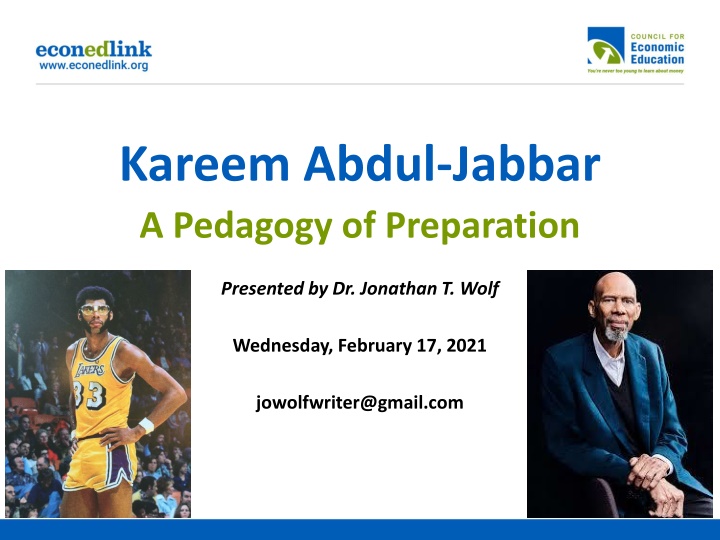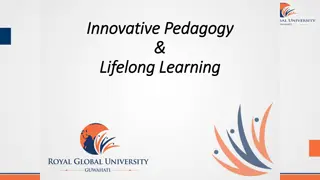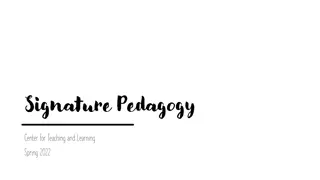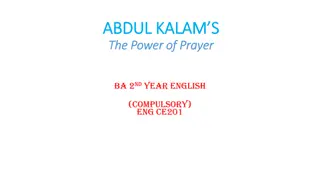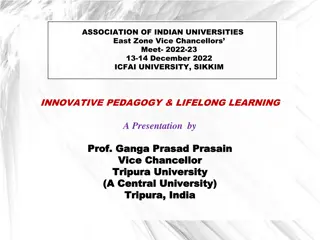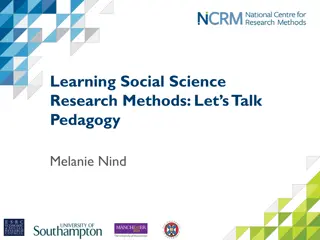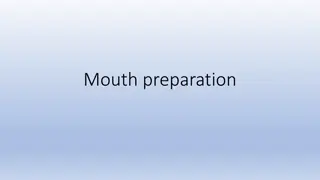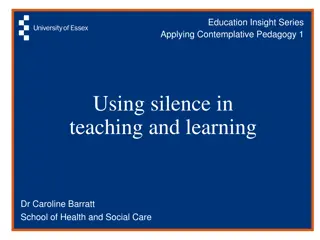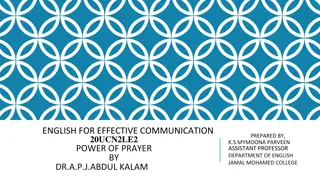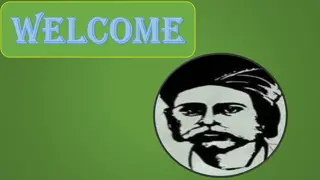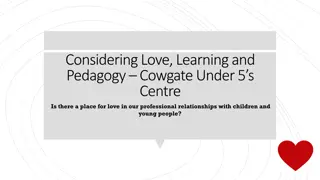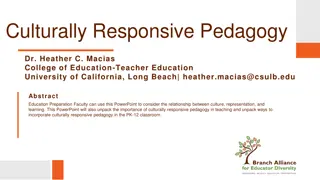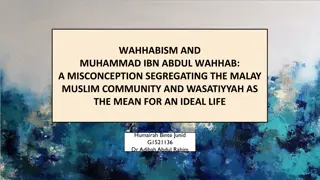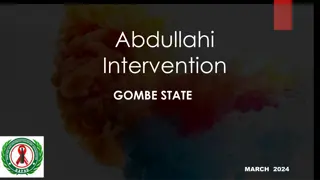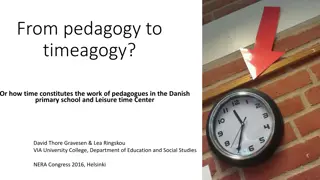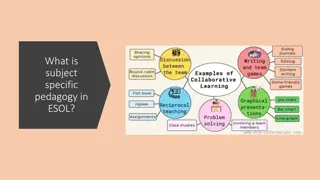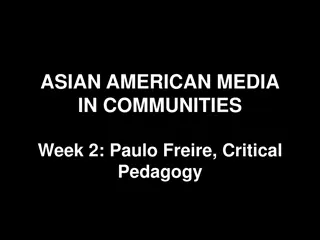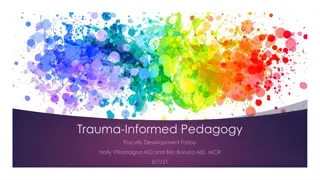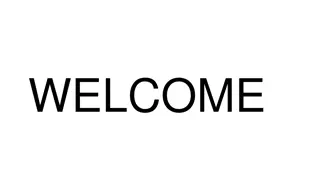Exploring the Pedagogy of Preparation with Kareem Abdul-Jabbar
Delve into the pedagogy of preparation through the life of Kareem Abdul-Jabbar, focusing on ethics as a foundational principle for success. Discover the thin line between teaching ethics and morality, empowering students to think ethically about achieving their goals without imposing strict definitions of what is moral or immoral.
Download Presentation

Please find below an Image/Link to download the presentation.
The content on the website is provided AS IS for your information and personal use only. It may not be sold, licensed, or shared on other websites without obtaining consent from the author.If you encounter any issues during the download, it is possible that the publisher has removed the file from their server.
You are allowed to download the files provided on this website for personal or commercial use, subject to the condition that they are used lawfully. All files are the property of their respective owners.
The content on the website is provided AS IS for your information and personal use only. It may not be sold, licensed, or shared on other websites without obtaining consent from the author.
E N D
Presentation Transcript
Kareem Abdul-Jabbar A Pedagogy of Preparation Presented by Dr. Jonathan T. Wolf Wednesday, February 17, 2021 jowolfwriter@gmail.com
EconEdLink Membership You can now access CEE s professional development webinars directly on EconEdLink.org! To receive these new professional development benefits, become an EconEdLink member. As a member, you will now be able to: Automatically receive a professional development certificate via e-mail within 24 hours after viewing any webinar for a minimum of 45 minutes Register for upcoming webinars with a simple one-click process Easily download presentations, lesson plan materials and activities for each webinar Search and view all webinars at your convenience Save webinars to your EconEdLink dashboard for easy access to the event You may access our new Professional Development page here
Professional Development Certificate To earn your professional development certificate for this webinar, you must: Watch a minimum of 45-minutes and you will automatically receive a professional development certificate via e-mail within 24 hours. Accessing resources: You can now easily download presentations, lesson plan materials, and activities for each webinar from EconEdLink.org/professional-development/
Instructor Biography Dr. Jonathan T. Wolf BA and MA from The City College of New York PhD from Fordham University Taught Composition and Rhetoric / American Literature for 13 years
Agenda Review objectives of webinar Review Kareem Abdul-Jabbar s biography Preparing for Success / Identifying Essential Skills Envisioning Your Future / What Success Means (to You) Conclusion Other resources
Objectives Over the course of this webinar, I will introduce an idea that I call the pedagogy of preparation. In the context of Kareem Abdul-Jabbar s life and his staunch allegiance to the work ethics instilled in him through his personal experiences and his work with Coach John Wooden, the pedagogy of preparation refers to an educational philosophy philosophy in which ethics is the foundational organizing principle upon which financial, spiritual and political success rests. educational There is a thin line between teaching ethics and teaching morality. Indeed, much of the discussion in this webinar, and those that you will have with you students, utilize my proposed assignments and verge into whether things are moral or immoral. What must be kept in mind is that objective of the pedagogy of preparation is NOT NOT to teach students what in particular is moral or immoral, but to give students the resources to empower them to think of success, in some part, ethically. In this sense, it is enough for us to proclaim the existence and importance of a moral world, without explicitly defining it for them.
Objectives, Contd Here we can trace our primary axiom: success accordance with some moral/ ethical principal. For instance, we might ask students Who is more of a winner: the person who follows the rules of a sport and loses, or the person who wins but cheats? Lance Armstrong comes to mind here; once a champion, his lack of ethics has turned him into a pariah. success. In some way, it is always shaped in Moreover, how we define success also suggests a praxis in how we should attain success. It becomes part of the imaginative process, depicting not just what we want, but who want want to to be be in or through its attainment. Returning to Mr. Armstrong, one might wonder how his vision of being a champion diverged (consciously or unconsciously) with his unethical actions. who we we Thus, a pedagogy of preparation asks us to define, analyze and refine that praxis in our everyday lives by creating creating a a groundwork groundwork for success. It s not just about what we do the moment before the biggame, but what we do in the months and years before it.
Objectives, Contd Abdul-Jabbar s biography is a perfect example of this idea because of how he links his his success success to to his his work work ethic ethic. . He is successful not because he hit one basket in a big game, but because he shot 100,000 baskets in practice for years. For him, it takes those 100,000 baskets just to make one game-winning shot. Likewise, many of his other successes, from acting to writing, emerge from his making ethical decisions around curiosity and education. Cultivating curiosity about the world enabled him to be introduced to other diverse arenas in which to succeed, ones he never would have known about if had been averse to exploring new ideas. links
Biography- The Early Years Kareem Abdul-Jabbar was born Ferdinand Lewis Alcindor Jr. on April 16, 1947, in New York City. Best known as a basketball player, Abdul-Jabbar has been an actor, martial artist, writer, scholar and activist. His eclectic interests arise from his lineage. His father, employed for most of his life as a transit police officer, was also an accomplished jazz musician who graduated from Julliard. As such, Kareem s childhood granted him a love of jazz and R&B, cultivated with exposure to New York s bohemian Greenwich Village. Moreover, as someone growing up in the middle of the Civil Rights movement, Lew Alcindor identified himself within the growing struggle for racial equality, leading him eventually to convert to Islam and rename himself Kareem Abdul-Jabbar.
Biography- High School & College Unusually tall, Kareem seemed destined for basketball greatness. While living in the Dyckman Public Housing Complex in Inwood, Manhattan, he became All-American high school player. He went on to play with the UCLA Bruins under the tutelage of Coach John Wooden, who would play a fundamental role in shaping and refining his work ethic not only in the NBA, but throughout all his professional ventures and personal successes. After leaving the Bruins, Abdul-Jabbar went on to play, at the time a record, 20 consecutive seasons in the NBA, first with the Milwaukee Bucks and then the Los Angeles Lakers. The list of accolades and records Kareem amassed in his basketball career are too numerous to mention, but a few should go to prove why he is still known as one of the greatest to ever play the game
NBA Highlights Rookie of the Year Six NBA MVP Awards Two NBA Finals MVP Awards Six NBA Championships Most points scored (Career) Fourth all time Rebound Leader Third all time in Blocks Most minutes played (Career)
Biography- Martial Arts & Acting He also worked notably as an actor and martial artist. During college he d begun to study Jeet Kune Do with Bruce Lee, and in 1972 made his movie debut in Lee s Game of Death
Abdul-Jabbar would go on to act in a multitude of supporting and cameo roles over the years, staring in a bevy of comedies, dramas, and commercials. And then there was his most memorable turn as co-pilot Roger Murdoch in 1980s classic comedy, Airplane!
Biography- Writer Wanting to know more about his religion, Kareem studied Arabic at Harvard. He also wrote numerous books on African-American history, including On the Shoulders of Giants: My Journey Through the Harlem Renaissance, co-written with Raymond Obstfeld, and Brothers in Arms: The Epic Story of the 761st Tank Battalion- World War II's Forgotten Heroes co-written with Anthony Walton, a history of an all- Black armored unit that served with distinction in Europe. On the Shoulders of Giants went on to become an award winning documentary. All of this while also taking on numerous roles in government and public service, and essay writing for major media publications. Abdul-Jabbar s retirement from the NBA only began his incredible role as author- activist and public advocate, culminating in his receiving the Presidential Medal of Freedom from President Barack Obama in 2016.
Suggested Reading Suggested Reading: Coach Wooden and Me, Chapter 2; Giant Steps, Chapter 7 Key Quotes Key Quotes: Mr. Wooden believed in supreme conditioning and unwavering fundamentals: not only knowing which plays to run and how to run them, but being capable of calling up the physical stamina at the precise time you need it to win, (Chapter 2, Giant Steps). Today, we are going to learn how to put on our sneakers and socks correctly, (Chapter 7, Coach Wooden and Me).
The story of Abdul-Jabbars first team practice with Coach Wooden provides an excellent introduction both to his biography and the pedagogy began Kareem s legendary basketball career so did the particular lesson Wooden departed onto his team, focusing on the importance of an iron-clad work ethic. pedagogy of of preparation preparation, for as it As Kareem narrates, in their first practice, Coach Wooden sat them down and taught them how to put on their socks, in what he called the snug-and-tug. Pull your socks on snugly around your feet, and tug them tightly up your calf. Seeing the looks of confusion on his players faces, he quoted a poem by Benjamin Franklin: For the want of a nail the shoe was lost/ For the want of a shoe the horse was lost/ For the want of a horse the rider was lost/ For the want of a rider the battle was lost/ For the want of a battle the kingdom was lost/ And all for the want of a horseshoe-nail
Wooden introduced to his team this most foundational skill: If you do not pull your socks on tightly you re likely to get wrinkles in them. Wrinkles cause blisters. Blisters force players to sit on the sideline. And players sitting on the sideline lose games (Coach Wooden and Me, Chapter 2). Abdul-Jabbar calls this idea essential and these skills, for him, encompass the foundation of greatness: All the most effective basketball strategists and players have kept their technique honed to its most lean and essential parts. John Wooden did it in his coaching; Bill Russell did it in his playing, and Oscar Robertson was the same way He didn t have blazing speed, and he didn t do a whole lot of pirouettes, all he did was score, rebound, and dish the ball off If you were going to stop him, you were just going to stop the basics, and you would have to do it perfectly because he could take advantage of any miscue you might make (Giant Steps, Chapter 11).
It is not too surprising then, that as a student of Bruce Lee, Abdul-Jabbar emphasizes Lee s focus on fundamentals as well: (Lee) pared down what he saw as the cute, inessential mannerisms that had crept into the teachings (of martial arts); techniques that did not give you any real advantage in a fight (Giant Steps, Chapter 9).
Assignment: Assignment: Rhetorical & Compositional Concepts Identifying & Describing Defining Categorizing These assignments work to get your students thinking about their own particular interests, identifying and describing possible career paths, defining what skills relate to those paths, and categorizing them in a hierarchy. What for them is the nail, or essential skill, that will make them successful in their field? How do other skills relate to that essential skill?
Assignment #1: Your Hook Shot Assignment #1: Your Hook Shot In Chapter 2 of Giant Steps, Abdul-Jabbar describes how he first discovered what would become his signature move: the hook shot. Interestingly, the first two times he tried it he did not make the basket. However, he saw that it felt right. With that in mind respond to the following prompts: 1) What would you consider to be your hook shot? That is, what strategy or technique do you employ in your everyday work that you most identify with? Remember, it does not necessarily mean that it is the most effective, only that it feels right for you. This can be anything from a way that you study, to a strategy you use in a video game, to a technique you have for folding clothes. 2) As best as you can, break down that hook shot into its component parts. For instance, if your study technique is to listen to music while you study, then describe the kinds of music you play or type of headphones you use. Even volume is a component part of that technique. 3) Finally, explain how those components can affect your hook shot. If you change one of those components, do you think you could make your hook shot more effective or feel better? How so? (Extra credit: Try one of those changes in the real world. Did that change have the intended effect?)
Assignment #2: Essential Differences Assignment #2: Essential Differences This assignment is intended to get students thinking about the skills they ll need to cultivate for future careers, and for exploring their feelings about achieving proficiency in those areas. There is a slight Internet research requirement, but it can be changed to a print requirement if desired. 1) Choose a career path that you might be interested in following, and generate a list of the top five skills (in order in order) you think one might need to succeed in that endeavor. 2) Go online to discover what people in that industry believe are the top five skills necessary for success in that field. (Hint: there are many, many results in Google if you type in top skills in ______ .) Try to use those you believe to be the most authoritative, but also realize that this question is quite subjective. Use your own discretion in choosing who you believe has the knowledge and experience to best list those skills. 3) Compare your list with the one by professionals. Is there any overlap? Difference? Has seeing what the professionals said changed your feelings? Would you want to become proficient in these skills? Why or why not?
Assignment #3: Perfect Skill Assignment #3: Perfect Skill This assignment is aimed in inspiring students to think about the relationship between habits, interests and work ethics to generate an understanding about interdisciplinary studies and careers. 1) What is something you enjoy doing? This can be anything from watching TV, video gaming, reading, or eating. Describe this activity in depth. 2) Generate a list of at least three skills involved in these activities. Be imaginative and far reaching as you imagine what skills are involved in these activities. Perhaps, for instance, going to parties is your activity; some skills you might have cultivated are a fashion sense, dance moves or DJ ing. For each of these skills, tell us a little about the knowledge behind these skills. Where does one go to find this knowledge? Where did you go? 3) Finally, think of some classes, internships or another experience that could help in adding to knowledge or skill cultivation. Check online and see what employers, schools or programs offer in helping students perfect these skills.
Suggested Reading Suggested Reading: Coach Wooden and Me, Chapter 1; Giant Steps, Chapter 1 Key Quotes Key Quotes: My homework got done because my mother made me do it, and after she d drilled it into me how important it was, I did it for myself, (Chapter 1, Giant Steps). Don t hope. Hope is for people who aren t prepared. My mother always emphasized that hard work was necessary to achieve your goals, while my father proved the value of repetition in mastering a skill, (Chapter 1, Coach Wooden and Me).
The previous quotes clearly demonstrate how Abdul-Jabbar understood his success as attributable to the efficacy of his essential skills: hard work and repetition repetition. What is less clear, if perhaps more obvious, is if these skills are not simply praised for efficacy but also for virtuousness. Indeed, one would be hard pressed to find anyone who does not think these are good values. hard work and At the same time, we have to realize that the goodness of these values (and perhaps any value system) cannot be divorced from the context and the intentions the intentions of those values. It s not just hard work and resolve that are good but that those virtues serve good ends. context and In part, we study Abdul-Jabbar not just for bringing those values to his basketball career but to also in his work as an activist for racial equality and religious understanding.
His story is further inspiring when we study the consequences ventures, those points in his life when his steadfastness of his convictions worked against his financial interests consequences of his socially conscious Here, the sections on his boycott of the 1968 Olympics (Coach Wooden and Me, Chapter 3 and Giant Steps, Chapter 8) and his conversion to Islam (Giant Steps, Chapter 6 and Coach Wooden and Me, Chapter 3) demonstrate how, ironically, many of those same values that brought him success in basketball also endangered his career, as many White coaches, team owners and media figures disagreed with his decisions. In reviewing these sections with your students, you should encourage them to think about how the essential skills discussed in Preparing for Success are interlinked with moral questions that can come into conflict with certain industries. What does it mean, for instance, for a good lawyer to defend a bad person? How do we rectify those conflicts?
Assignments: Assignments: Rhetorical & Compositional Concepts Identifying & Describing Comparing & Contrasting Defining These assignments work to get your students thinking about the ethics related to their own particular interests: identifying and describing them, comparing and contrasting the ethical values of industry standards with some famous individuals working in those industries, and developing some definitions of their stances on ethics. Is there an essential ethic? How do those ethics intersect with our understandings of essential skills?
Assignment #1: Your (Ethical) Boundary Assignment #1: Your (Ethical) Boundary We all know ethics are important, but what are ethics? This assignment should create a groundwork for your class to further investigate important ethical questions. 1) In a paragraph, describe ethics. What is the importance of ethics to you? What does it mean to be an ethical person? 2) Look up the word ethics in the dictionary, and write out the definition here. 3) Compare your description of ethics to the dictionary definition. What ideas do you and the dictionary share and what differ? What did the dictionary add to your idea of ethics that you think you should incorporate, and what ideas do you have that you think the dictionary missed?
Assignment #2 Assignment #2: Working Ethics Working Ethics We will look at the ethical standards of particular careers and industries, and think about the challenges people within those careers and industries may face in adhering to those ethical standards. 1) Choose a career or industry that interests you, then do a bit of research to discover some of the ethical standards, policies or considerations practiced within that career or industry. Many companies will have information about this on their webpage, while other industries may require a bit more in depth investigation. 2) Then, using your research, discuss a bit about the ethical challenges one might face when working within that industry. What may tempt a lawyer to, for instance, encourage a witness to lie on the stand, an athlete to cheat or a politician to take a bribe? Try not to think just of sheer greed and malfeasance, but consider some alternate ideas. 3) Finally, give some concluding thoughts on how one may overcome those ethical challenges. Are there support systems to help people in these industries work though those issues? What skills could one cultivate in aiding people in these industries make better ethical choices?
Assignment #3: Our Ethical World Assignment #3: Our Ethical World We will look at Kareem Abdul-Jabbar s stances on racial equality and his life long work in activism to try to inspire students to think about how they would like to make our world more ethical and just. 1) As we have seen, Kareem Abdul-Jabbar was inspired to work as an activist for racial equality and social justice because of his experiences being Black in America. Choose a cause you feel strongly about and describe it. Why is it important to you? 2) Imagine you are a tremendous success in your field: how would you use that success to advance your cause? What might be the repercussions of that action? What would you stand to lose for standing up for what you believe in? Be specific. 3) Finally, suggest three things you can do now to prepare yourself for ethical success. To help, you might want to look at the previous assignment and reflect on what policies and departments industries have for maintaining ethical standards for their employees. How can some of those ideas shape your work ethic? What places can you turn to for help?
There is a phrase in basketball: learning to play without the ball. This phrase is a catch-all term for actions a player can make when they do not have the literal ball that prepares them, or another player, to score. Coaches often find this very hard because players typically think about their performance in the moment. They focus on making the basket, rather than how to get to the basket. We educators face a similar challenge: Students want to do well, but often they forget or never learn about the work ethics that can prepare them to do well on a test. Kareem Abdul-Jabbar s biography can help display the importance of establishing a strong work ethic. The assignments and discussion prompts I have outlined in this presentation provide not just exercises in key rhetorical and compositional concepts but also introduce and encourage them to develop their own work ethic that is so fundamental to academic, professional, and personal achievement. In reviewing Abdul- Jabbar s biography along with the pedagogy of preparation, it is my hope that we may inspire students to become not only good scholars but better people.
References Abdul-Jabbar, Kareem & Peter Knobler. Giant Steps: The Autobiography of Kareem Abdul-Jabbar. Amazon. 2017 (Kindle Edition). Abdul-Jabbar, Kareem. Coach Wooden and Me: Our 50-Year Friendship. Hachette Book Group, 2017 (Kindle Edition).
CEE Affiliates https://www.councilforeconed.org/resources/local-affiliates/
